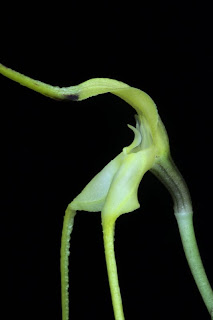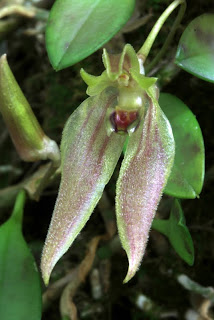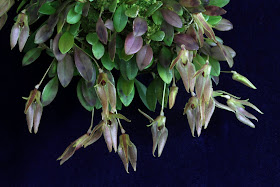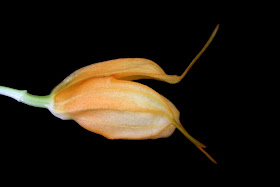Tuesday, December 24, 2013
Masdevallia angulifera 'J & L' AM/AOS
Masdevallia angulifera belong to the Saltatrices group of Masdevallias, those with tubular, hair-lined flowers that have a pronounced "belly" at the base of the tube. The plant is 12cm tall and the 2.5cm flowers are held above the leaves. This clone was awarded by the American orchid Society for its dark color. I grow it in a net pot in live sphagnum moss.
Thursday, December 19, 2013
Trisetella strumosa
Trisetella vittata is a tiny species from Ecuador. All the species in this genus are small, are closely related to Masdevallia and were once classified with Masdevallia. The plant is 3cm tall, the spikes 4cm long and the flowers 2.5cm from tip to tip. The Trisetellas can be very difficult to identify but I am reasonably certain that this is Trisetella strumosa.
Tuesday, December 17, 2013
Phalaenopsis violacea var. alba.
I purchased this species as a tiny seedling and it has been in bloom off and on for several years now, as is characteristic of the species, which blooms on long lasting flower spikes that produce only one flower at a time but do so over many years. The ordinary form of this species has purple coloring especially on the lower parts of the flower, but this is a colorless form or alba. Phalaenopsis violacea is from Malaysia and Sumatra.
Friday, December 13, 2013
Paphiopedilum venustum
My Paphiopedilum venustum is in bloom again. It blooms faithfully very year in winter or early spring. The flowers on my plant are nothing special, rather small for the species and rather poorly shaped, but the species is worth having even then and the detail of the flowers is incredible. The plant is from the Himalayas, Nepal, Indian and Bangladesh.
Friday, December 6, 2013
Acianthera bragae
Acianthera bragae, also known as Pleurothallis sarracenia, is a tiny creeping species with terete (pencil-like) leaves. The leaves are 3cm long and grow in a row on a creeping stem. The 2cm flowers usually comes in pairs with the flowers facing each other, but occasionally as one. The species is from Brazil. I grow it mounted and with cool temperatures.
Wednesday, December 4, 2013
Spilotantha amanda
From Ecuador, this charming little species still goes under the name Masdevallia amanda, but has been reclassified as Spilotantha amanda. The plant is only 8-10cm tall and the flowers are 1.5cm, three of four per spike. "Amanda" means "beautiful" and the flowers, though rather oddly shaped are beautifully colored when seen up close.
Wednesday, November 27, 2013
Masdevallia naevia
Masdevallia naevia belongs to the Caudatae section of the genus Masdevallia and comes from Ecuador. The flowers are beautifully colored but always look awkward and stiff to me. The plant is 12-15cm and the flowers 10-12cm. The species name, "naevia" means "birthmark" and refers to the purple spot on the dorsal sepal. The section it belongs too, Caudatae, gets its name from the long "tails" that the species in this section have.
Monday, November 18, 2013
Epigeneium nakaharaei
I posted this species not long ago, but took more pictures the other day since it is now at the peak of its bloom cycle and covered with flowers. At that time I wrote: Epigeneium nakaharaei is from Taiwan and is closely related to Dendrobium. In fact, it was once classified as a Dendrobium.
The growths are 3-4 cm and the flowers 2.5 cm with a glossy brown lip.
It quickly forms a large clump and scrambles all over and for that
reason is best grown on a mount. It blooms in the autumn. The individual flowers are not long lasting, but it continues to produces flowers for several months.
Barbosella australis
It must be Barbosella season since all of my species have been in bloom recently including this species. Barbosella australis is a rather common miniature orchid species from Brazil (the name "australis"
means "southern"). It should be grown on a mount and forms a creeping
mat of small 1.5 cm leaves and produces flowers that larger than the
leaves, about 2 cm long. It is related to Pleurothallis and Masdevallia, a Pleurothallid.
Masdevallia fuchsii
Masdevallia fuchsii is from Peru and belongs to the Saltatrices section of the genus, plants whose flowers are tubular and have "bellies" and hairs on the insides of the flowers. I have several plants of this species and this plant's flowers are more yellow than the others. The plant is 10cm tall and the flowers 4cm.
Wednesday, November 6, 2013
Masdevallia strobelii
This is a very small plant but a prolific bloomer and very fragrant. Masevallia strobelii belongs to the Saltatrices section of the genus Masdevallia and has the typical features of the species in that section, a slight
bulge or "belly" at the bottom of the flower, the flower tube lined
with glandular hairs and bright color. It comes from Ecuador and is much used in hybridizing. As with almost all my Masdevallias, it is grown in live sphagnum in a plastic net pot.
Barbosella cucullata
I've posted this species before, but last time it bloomed it had only two flowers. It did much better this fall. The species has thick, channeled leaves 5 cm long and 4 cm flowers on 15 cm spikes. It is from Bolivia, Colombia, Ecuador, Peru and Venezuela and is related to Masdevallia and Pleurothallis. I grow it in live sphagnum and try to keep it slightly dry which it seems to prefer. I've found, too, that the flowers are not very long-lasting.
Friday, October 25, 2013
Masdevallia medinae
Masdevallia medinae is from Ecuador and is a very small species, only 4-5 cm tall with flowers that are nearly as large, around 4cm. I tis supposed to warm-growing, but I grow it cool-intermediate with all my other Masdevallias. It is potted in live sphagnum and blooms in late fall or winter.

















































